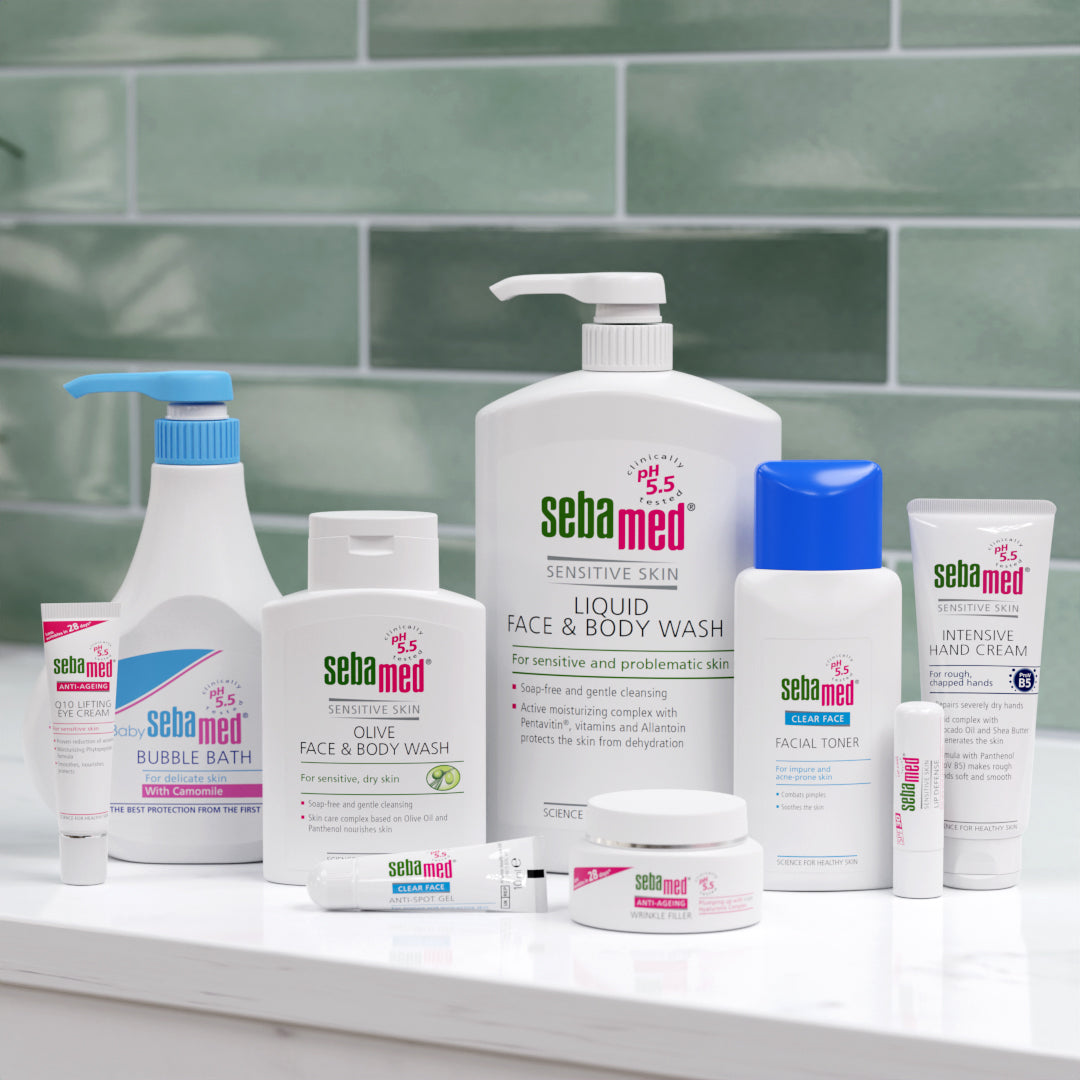Children’s skin is more sensitive than adults and requires extra special care to keep it healthy and soft. Teaching a good skincare routine to children helps prevent issues like dryness, irritation and sun damage. It also creates a good foundation for lifelong healthy skin. Find out why children need different skincare products to adults, what common skin complaints children have and what order children should apply their skincare products.
Why do children’s skin need different skincare products than adults?
Children’s skin is thinner and their natural skin barrier hasn’t fully developed yet. In fact, this can take up to the age of approximately 12 to fully stabilise. This means their skin is far more sensitive than an adult’s and can react badly to products with harsh ingredients, (think rashes, irritation and dry skin). Also, children’s skin loses moisture faster, so the skin needs extra hydration to stay healthy and soft. Young children produce less oil, so kids skincare products require gentle, hydrating ingredients that help soothe the skin. As they reach puberty, oil production increases, which means children’s skincare needs will change - focussing more on preventing acne and controlling excess oil.
Another important difference is pH balance. Healthy skin has a slightly acidic pH of around 5.5, which helps protect against bacteria and irritation. Children’s skin is still adjusting to this balance - so being able to use pH-balanced skincare products is vital in keeping their skin healthy and strong.
Therefore, when choosing a skincare routine for children, choose one that’s simple, and that creates healthy skincare habits, without damaging the skin. Avoid products that contain harsh chemicals - they’re unnecessary and can cause long term damage. Instead, choose gentle, pH-balanced products like a soothing cleanser, and a hydrating moisturiser to protect delicate skin and build healthy skincare habits.
What are common skincare complaints kids have?
As children’s skin is delicate, it can lead to common skincare issues; here are some of the most common skincare complaints in kids.
Dry Skin: Often caused by cold weather, hot bath or harsh soaps. Children’s skin might feel rough, flaky or itchy. When choosing skincare products, use a gentle, pH-balanced and hydrating moisturiser to help tackle dry skin.
Eczema: Eczema can cause red, itchy and irritated patches on children’s skin. It’s usually triggered by allergies, harsh chemicals or weather changes. When choosing kids skincare products, use a gentle moisturiser that is formulated with soothing ingredients.
Sunburn: As children’s skin is more sensitive, it makes it easier to burn in the sun which can lead to long-term skin damage. That’s why it’s vital that children wear suncream when out in the sun. Apply a high SPF like 50+ and always encourage wearing hats or sunglasses to protect the skin and eyes.
Rashes: Rashes are another common skin complaint for children. They’re caused by heat, sweat or reactions to skincare products. Some common rashes might be nappy rash, heat rash or an allergic reaction. Choose skincare products that target the particular concern, like our Baby sebamed Diaper Rash Cream or Baby sebamed Cream Extra Soft.
Acne: Hormonal changes in preteens and teenagers can lead to breakouts, blackheads, pimples and oily skin. Some children can have mild acne way before the teenage years, so it’s good to start talking about a skincare routine early on. When choosing children’s skincare products, use a gentle cleanser, designed for acne-prone skin and make sure you stay away from harsh ingredients.
Chapped Lips: Children can easily experience chapped lips due to the cold weather or too much lip licking. This can cause dryness and cracking and make them feel sore. Choose a lip balm, like the sebamed Lip Defence SPF30 as not only does it use gentle ingredients like Jojoba Oil, but it also protects against UV rays.
Over Sensitive Skin: Some children have naturally very sensitive skin, and as their skin barrier is not fully developed - it’s particularly important to use gentle, pH-balanced skincare products that help protect the skin. Our Baby and Child Range is perfectly formulated for sensitive skin. If your child is 12 years and over, then our Sensitive Skin range also has a wide range of products specially designed to soothe and protect sensitive skin that can easily be added to a skincare routine.
What order should children apply their skincare products?
Cleanser
Cleansing is the most important step in a skincare routine for children. Cleansing helps to wash away the dirt, makeup and any grime throughout the day. This can be done when they brush their teeth in the morning, or before bed. Always choose a cleanser with gentle ingredients, as harsh chemicals can strip the skin and damage it. That’s why we love our Baby sebamed Gentle Wash - it’s suitable for all ages, and contains soothing ingredients like Allantoin to help protect against dryness.
Toner
Toner isn’t necessary to add to a skincare routine until children are a little older (12+) or when they begin puberty. At that age or older, it can help with acne and maintain a healthy pH balance. Toners are used to help remove any remaining traces of makeup, cleanser or dirt which might be left on the skin, even after cleansing. If you are looking for a toner - choose one with gentle ingredients like Witch Hazel (Hamamelis virginiana) and Panthenol, which helps the skin repair itself. Our sebamed Clear Face Facial Toner is just the thing for oily and acne-prone skin.
Moisturiser
Moisturiser is everyone’s favourite step to apply and is applied daily; morning and evening. Whether your child’s skin is dehydrated and feels dry, or it has too much sebum and feels oily - there’s a moisturiser that can help protect your skin and leave it feeling smooth and hydrated. As children’s skin is thinner and more sensitive than adults, you need a gentle moisturiser that doesn’t irritate the skin. Our gold award-winning Baby sebamed Body Milk contains nourishing ingredients like Sweet Almond Oil and Shea Butter to help protect against dryness.
Remember: Your child’s skin barrier isn’t fully stable until around the age of 12. We know they may resist using a product they see as ‘for babies,’ but these formulas have been proven to provide important protection from infancy through to the pre-teen years - so try to persevere!






